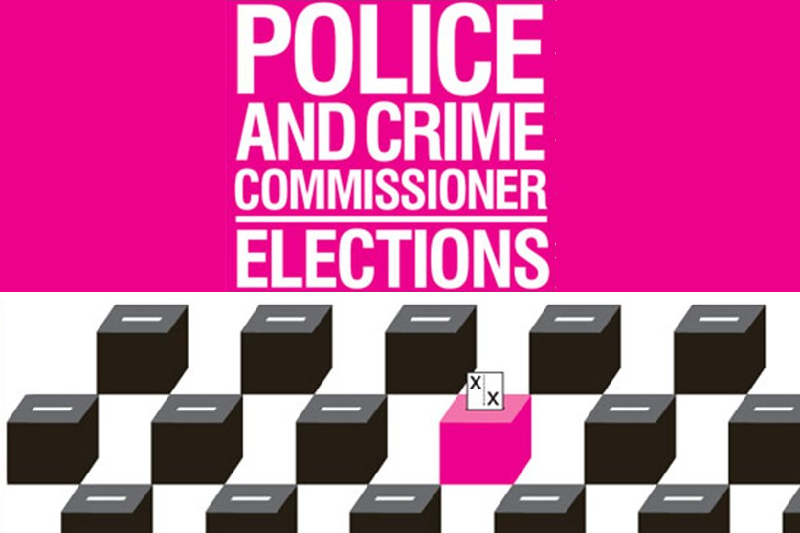Note that PCC elections in England and Wales were postponed for one year (to May 2021) because of Coronavirus, shortly after the publication of this article. Policing Insight’s coverage of the PCC elections will therefore be relaunched in March 2021 or thereabouts.
The Police and Crime Commissioner (PCC) elections are set to take place in just under two months time across England and Wales, on Thursday 7 May 2020. Policing Insight will be following the contest closely and today we are delighted to launch our special PCC Elections 2020 coverage.
PCC Election 2020: Click a region to view candidates and results from previous elections
Avon & Somerset | Bedfordshire | Cambridgeshire | Cheshire | Cleveland | Cumbria | Derbyshire | Devon & Cornwall | Dorset | Durham | Dyfed-Powys | Essex | Gloucestershire | Gwent | Hampshire | Hertfordshire | Humberside | Kent | Lancashire | Leicestershire | Lincolnshire | Merseyside | Norfolk | North Wales | North Yorkshire | Northamptonshire | Northumbria | Nottinghamshire | South Wales | South Yorkshire | Staffordshire | Suffolk | Surrey | Sussex | Thames Valley | Warwickshire | West Mercia | West Midlands | West Yorkshire | Wiltshire
With 36 Police and Crime Commissioners (PCCs), and four Police, Fire and Crime Commissioners (PFCCs) to be elected, and nominations closing in just a month’s time, you might imagine that there would already be a plentiful supply of declared candidates. But, as we’ve put together our dedicated forty “force area” pages for these elections, we’ve found that’s not the case.
Our research has found 60 declared candidates to date. In 2016, there were a total of 188 candidates – 40 Conservative, 40 Labour, 34 UKIP, 30 Liberal Democrat, 25 Independent, seven Green, four Plaid Cymru, four English Democrat, three Zero Tolerance Policing, and one Lincolnshire Independent.
Here are details of the 60 declared candidates for these 2020 PCC elections, split by political party and by force area.
PCC Elections 2020: Declared candidates
| Tory | Labour | LibDem | Indep | Plaid C | Total | |
| Avon & Somerset | 1 | 1 | 2 | |||
| Bedfordshire | 1 | 1 | 2 | |||
| Cambridgeshire | 1 | 1 | ||||
| Cheshire | 1 | 1 | ||||
| Cleveland | 1 | 1 | 2 | |||
| Cumbria | 1 | 1 | ||||
| Derbyshire | 1 | 1 | 2 | |||
| Devon & Cornwall | 1 | 1 | ||||
| Dorset | 1 | 1 | 1 | 3 | ||
| Durham | 1 | 1 | ||||
| Dyfed-Powys | 1 | 1 | ||||
| Essex | 1 | 1 | ||||
| Gloucestershire | 1 | 1 | 2 | |||
| Gwent | 1 | 1 | ||||
| Hampshire | 1 | 1 | ||||
| Hertfordshire | 1 | 1 | 2 | |||
| Humberside | 1 | 1 | 2 | |||
| Kent | 1 | 1 | ||||
| Lancashire | 1 | 1 | ||||
| Leicestershire | 1 | 1 | 2 | |||
| Lincolnshire | 1 | 1 | ||||
| Merseyside | 1 | 1 | 2 | |||
| Norfolk | 1 | 1 | ||||
| North Wales | 1 | 1 | ||||
| North Yorkshire | 1 | 1 | 2 | |||
| Northamptonshire | 1 | 1 | ||||
| Northumbria | 1 | 1 | 2 | |||
| Nottinghamshire | 0 | |||||
| South Wales | 1 | 1 | 2 | |||
| South Yorkshire | 1 | 1 | ||||
| Staffordshire | 1 | 1 | 2 | |||
| Suffolk | 1 | 1 | ||||
| Surrey | 1 | 1 | 2 | |||
| Sussex | 1 | 1 | ||||
| Thames Valley | 1 | 1 | 2 | |||
| Warwickshire | 1 | 1 | ||||
| West Mercia | 1 | 1 | 2 | |||
| West Midlands | 1 | 1 | 1 | 3 | ||
| West Yorkshire | 1 | 1 | ||||
| Wiltshire | 1 | 1 | 2 | |||
| TOTALS | 29 | 17 | 4 | 8 | 2 | 60 |
So, an average of 1.5 candidates per force area, with – as far as we can tell from our research – only one (Nottinghamshire) without any declared candidate at the moment. Twenty force areas have one declared candidate, 17 force areas have two declared candidates, and two (Dorset and West Midlands) have three declared candidates.
Bear in mind, though, that there are a number of incumbent Police and Crime Commissioners where we have been unable to date to find any public declaration of their re-election intentions. These include Paddy Tipping, the Labour PCC for Nottinghamshire: historically, Nottinghamshire has been a force area that the Labour PCC has comfortably held at the last two PCC elections.
Plaid Cymru gained two force areas at the last PCC elections in May 2016, and both their incumbent PCCs have declared their intention to run again. On this basis, it’s fair to say that Plaid are by far the most organised political party. As a Welsh party, there are only two further possible force areas where they might run candidates, specifically Gwent and South Wales. Plaid were a distant third place in Gwent four years ago, so might not be treating this force area as a priority. They were also third in South Wales, missing second place only by 29 votes in South Wales, but the winning Labour candidate was over 90,000 votes (over 20% of all votes) ahead there, so it would be difficult to imagine them increasing their PCC representation.
An earlier declaration of the candidate would arguably have given more opportunity for them to establish a local profile, win credibility, and hence garner more votes
The Conservatives have selected and announced candidates in 29 of the 40 force areas. The eleven areas in which we could find no such announcements include Cumbria and Warwickshire (where the sitting Conservative PCCs appears not to have yet declared whether they are standing again or not); Dyfed-Powys (which the Conservatives held between 2012 to 2016 before losing by three percentage points to Plaid Cymru in those 2016 PCC elections); and Durham, Nottinghamshire and West Yorkshire, where the December 2019 General Election results suggest that Labour’s so-called “Red Wall” might, perhaps, be vulnerable.
Labour itself have – remarkably – selected and announced candidates in only 17 of the 40 force areas. I say “remarkably” simply because those 23 areas still missing a declared Labour candidate include force areas not held by Labour but where they appear to have a chance of victory. An earlier declaration of the candidate would arguably have given more opportunity for them to establish a local profile, win credibility, and hence garner more votes. In Avon & Somerset, for example, the Independent PCC is stepping down after two terms: Labour came second in Avon & Somerset at the last elections, and were within 2.5 percentage points of first place in the first round, with the Conservative candidate over four percentage points further behind. All that said, maybe the ongoing Labour leadership elections – with results not due to be announced on 4th April – might have delayed some decisions and announcements.
The Liberal Democrats do not have a strong pedigree in PCC elections, never having returned a PCC to power. It may be unsurprising, therefore, that there are only four declared Liberal Democrat PCC candidates to date.
There are, however, eight declared independent candidates, one of whom (in Gloucestershire) is a sitting PCC. None of the other sitting Independent PCCs (in Avon & Somerset, and in Dorset) is running again – though both these force areas have other Independent candidates already declared. It will be interesting to see whether those two candidates are able to carry that independent heritage through to another Independent election victory. I suspect they’ll find it a considerable challenge – though PCC elections have regularly thrown up surprises and even shocks.
The foot-and-mouth disease outbreak in 2001 led to postponement of local elections that year. The ongoing Coronavirus outbreak might have the same electoral impact this May.
One area where there’s unlikely to be much surprise, though: turnout. At the first PCC elections in November 2012, average turnout was only 15.1%. It improved in 2016 to 27.3%, partly as the elections were held in (warmer and lighter) May, and partly because there were a significant number of other local elections taking place on the same day to tempt voters to the polls. Although these 2020 elections are also in May, the draw of other local elections on the same day looks likely to be weaker than in 2016, plus a number of other factors (election fatigue, Coronavirus concerns) that look likely to weigh against encouraging turnout. We’ll see whether turnout is able to stay above 20%: at the moment, I very much doubt it.
One further possibility: that these PCC elections might yet be postponed. The foot-and-mouth disease outbreak in 2001 led to postponement of local elections that year. The ongoing Coronavirus outbreak might have the same electoral impact this May.
If you’re interested in the PCC elections, Policing Insight will be THE place to get your regular updates. And if you’ve got any news (do you know of a candidate we haven’t spotted yet?), or are yourself a candidate who wants to provide us with your Election Address, do please let us know by commenting on this article, or indeed on any of our Policing Insight Election 2020 material.
Postscript: Note that, as further candidates declare following publication of this article, we will update individual Force Area pages. However, this article itself will remain a reflection of the position as at time of original publication.
Related articles
 All change: Policing governance is a hot topic once again
All change: Policing governance is a hot topic once again
The PCC elections are set to take place in May. Deloitte’s fourth report into Police and Crime Commissioners is also due out the same month and will enable new and returning PCCs to optimise their role at a time of considerable change in policing. Deloitte’s Frances Lysak explains the focus of this latest report.
 Learning the lessons: What previous PCC elections can tell us about this year’s contest
Learning the lessons: What previous PCC elections can tell us about this year’s contest
This May, in England and Wales, the public will go to the polls to elect their local Police and Crime Commissioner. Professor Peter Joyce and Dr Wendy Laverick examine the lessons to be learnt from the previous two elections in 2012 and 2016 and what prospective candidates are likely to focus on in 2020.
 There’s (another) election on the horizon: The PCC race for 2020
There’s (another) election on the horizon: The PCC race for 2020
While the focus of attention is on the upcoming general election, candidates for the next round of PCC elections are also becoming clear. Nina Champion, Director of the Criminal Justice Alliance, and Phil Bowen, Director of the Centre for Justice Innovation, look at how the race could affect criminal justice policy.



For Info, I was reselected unopposed some months ago as Conservative candidate and will be standing again in Cumbria.
Many thanks for letting us know, Peter – I’ll update our Cumbria PCC Elections page.
I am standing for the Police Fire and Crime Commissioner ( PFCC ) of North Yorkshire. The present Conservative PFCC is not continuing in the role. The Conservatives have nominated the campaign Director who acted for the outgoing PFCC in both the 2012 and 2016 elections. I believe there should be no politics in Policing or the Fire Service.
Independent and experienced.
Keith Tordoff MBE
http://www.keithtordoffmbe.co.uk
Many thanks, Keith. You may have seen that your initial candidate details are already on our North Yorkshire page at https://policinginsight.com/elections-2020/pcc-election-2020-north-yorkshire/. We’ll shortly also be asking PCC candidates to send us their election address – do please keep an eye on Policing Insight for further announcements.